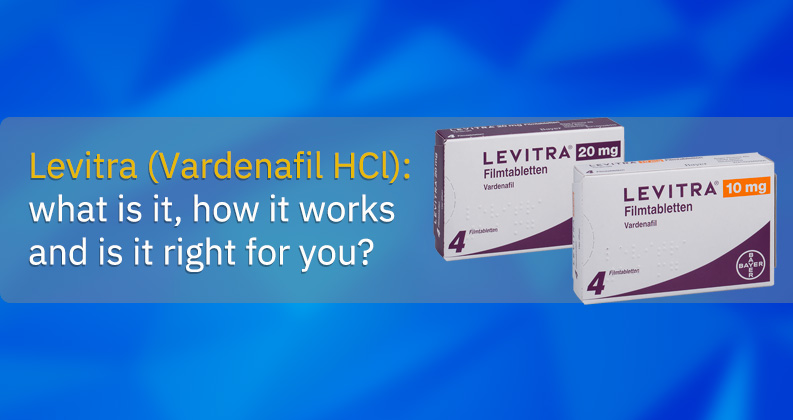
If you're experiencing erectile dysfunction, your doctor may recommend trying a medication like Levitra. Here's what you need to know about this drug and how it works:
What is Levitra used for?
Levitra is a prescription medication used to treat erectile dysfunction (ED). It is also used to treat pulmonary arterial hypertension (PAH) in adults, a condition that causes the right side of your heart to work harder than usual.
If you're taking Levitra for ED, it's important to know that it only works when taken before sexual activity. The drug has no effect if you take it after sex or if you don't get an erection, so check with your doctor about proper timing and dosage.
How does Levitra work?
Levitra is a PDE5 inhibitor, which works by inhibiting an enzyme called phosphodiesterase-5. When you have an erection, your penis fills with blood and becomes hard. This is because two chemicals are involved in the process: nitric oxide and cyclic GMP (cGMP). Nitric oxide causes relaxation in your blood vessels and allows more blood to flow into your penis, while cGMP triggers muscles within the walls of those blood vessels to relax. This combination increases blood flow to the penis, leading to an erection.
PDE5 inhibitors work by blocking PDE5 from breaking down cGMP quickly enough so that more cGMP builds up within your body's tissues—specifically those surrounding your penis—making them relax even more than usual and allowing for increased blood flow into the area for an erection when desired.
Does Levitra come in a generic form?
The short answer is yes. Vardenafil HCl is the generic version of Levitra and works similarly; the only difference between them is their cost.
The FDA approves generic drugs as safe and effective as brand-name drugs. Still, they may not always be available in your local pharmacy or your insurance plan's formulary (list of covered medications). If a drug isn't on an insurance company's formulary, you'll have to pay for it out of pocket if you want it—and you might have to get a prescription from another doctor if yours doesn't sell it at his office.
How should Levitra be taken? (dosing information)
The usual dose of Levitra is 10 mg, taken 1 hour before sex. Depending on its effect, the dose can be adjusted anywhere from 5 mg to 20 mg. You should contact your doctor for further instructions if the side effects are too strong.
Levitra should not be taken more than once a day and should not be taken with grapefruit juice or alcohol because these substances may interfere with how well the drug works.
Can Levitra be used alone or with other medications?
You can take Levitra with many common medications. However, you should not take Levitra if you are taking any of the following drugs:
● Ritonavir (Norvir)
● Nelfinavir (Viracept)
● Indinavir (Crixivan)
● Atazanavir (Reyataz)
These drugs are all protease inhibitors for HIV treatment and work by blocking the breakdown of a specific enzyme in your body. These enzymes are used to break down Levitra and make it less effective. If you take one of these antiretroviral drugs, you mustn't take Levitra simultaneously. Wait at least 24 hours after stopping treatment with an antiretroviral medication before taking Levitra or tadalafil (Cialis).
What are the side effects of Levitra?
Side effects of Levitra include headache, nausea, nasal congestion, indigestion, and dizziness. Tell your doctor if any of these side effects bother you or do not go away.
You may notice an increase in your sexual desire while taking Levitra. This can be good if you feel a low sex drive or have difficulty getting an erection. However, if this increase in libido is bothersome or makes it harder for you to control your sexual behavior, talk to your doctor about it.
What happens when I stop taking Levitra?
When you stop taking Levitra, it should not cause any permanent damage to your body. However, if you suddenly stop taking this medication and do not take another dose within 24 hours of the last one, you may experience some side effects. These side effects may include headaches, dizziness, and nausea. Contact your doctor immediately if you experience these symptoms after stopping Levitra use.
How much does Levitra cost?
Levitra is not a cheap drug. The average price of one 10 mg tablet is about $12, though this can vary depending on the pharmacy’s pricing structure. You can save money by buying online (the cost per pill is even lower), but if you are paying with your insurance, check with your provider before doing so.
Levitra cost per pill: The typical retail price for Levitra pills at local pharmacies ranges from $10 to $20 per pill, depending on dosage and form factor (whether it's a tablet or liquid). Prices for generic versions of Vardenafil HCl range from $4 - $5 per pill for those who do not have health insurance coverage or prescription coverage through their employer/union benefits plan since most prescription drug plans typically cover these medications.*
How does Levitra compare to similar drugs?
Levitra (vardenafil) is a PDE5 inhibitor, like Viagra. It's the second most popular prescription medication for erectile dysfunction (in second place to Viagra). Levitra works like Viagra—by relaxing blood vessels in the penis, allowing more blood flow and an erection.
However, there are several differences between these two drugs that make Levitra more appealing:
● You can take Levitra on an as-needed basis; it doesn't require you to take it daily or even weekly
● Your doctor can prescribe a lower dose of Levitra than they would of Viagra
What are the pros and cons of Levitra?
You may be wondering: What are the pros and cons of Levitra? Before deciding whether this medication is proper for you, here are a few things to consider.
Pros:
● It's easy to take in pill form.
● You can take it with or without food, as long as you follow the instructions on your prescription label.
Cons:
● It takes a while to work—around an hour, so set aside time before taking it if that concerns you.
And that's all there is to know about Levitra!
How to know if Levitra is right for you?
If you have erectile dysfunction, discussing your health history with your doctor before starting any medications is important. They'll help you decide if Levitra is right for you.
If you have a heart condition, such as high blood pressure or coronary artery disease, Levitra might not be the best option for managing your condition. Your doctor can help guide you on what treatment is best for this condition and how it interacts with other medications that may be prescribed to treat it.
If you've had a stroke or heart attack in the past 6 months or have liver or kidney disease, speak with your doctor about other treatments that may work better for those conditions than Viagra (sildenafil) and Cialis (tadalafil).
If you experience low blood pressure during sex due to certain health conditions like diabetes or anemia -- this can cause more problems while trying to get an erection which could result in a prolonged time getting one going! Your physician will help find out if Viagra works well enough on its own without needing any additional support from drugs like Clonidine."
Conclusion
In the end, Levitra is a good option for men who have trouble getting and maintaining an erection. You can use it alone or with other medications to treat erectile dysfunction. Please consult your doctor if you have questions about Levitra or another treatment.









